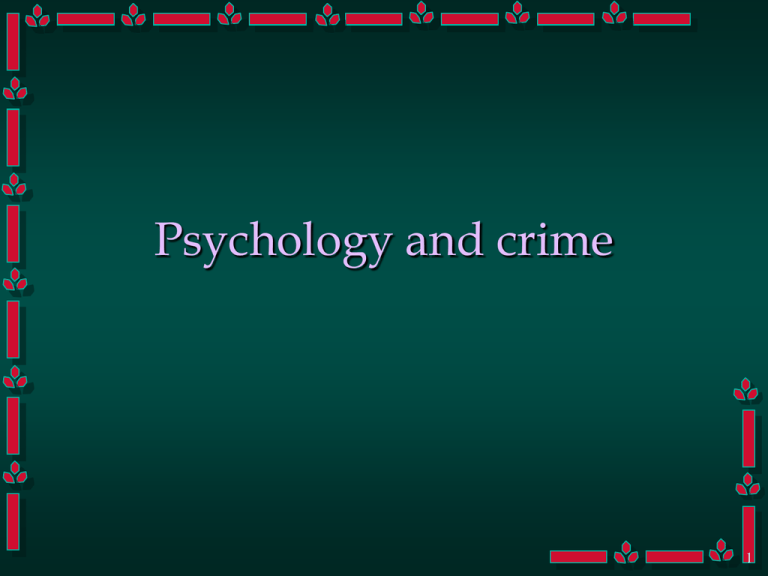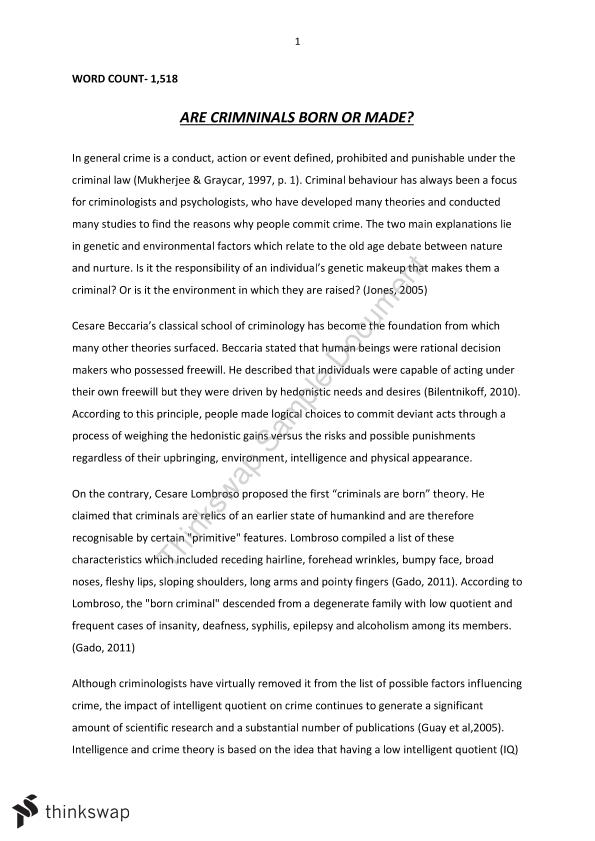The Fascinating Psychology Of Crime: Understanding The Mind Behind Wrongdoing
Ever wondered why people commit crimes? It's not just about breaking the law—it's a deep dive into the psychology of crime, where the human mind can be both fascinating and terrifying. The study of criminal psychology has become increasingly important in understanding why people engage in unlawful activities. This isn't just about catching bad guys; it's about unraveling the layers of the human psyche that lead to criminal behavior.
Let’s face it, crime happens everywhere. Whether it’s a small theft or a major heist, the psychology of crime plays a crucial role in understanding the motivations and triggers behind these actions. It’s not all about the act itself—it’s about what’s going on in the head of the person committing the crime. That’s where things get really interesting.
From serial killers to white-collar criminals, the psychology of crime provides insights into the motivations, patterns, and psychological factors that influence criminal behavior. By understanding these elements, we can better address crime prevention and rehabilitation. So, buckle up because we’re diving deep into the dark corners of the human mind.
- Msg Ashley Henning The Story You Need To Know About
- Jackerman Warmth Part 3 Unveiling The Heartwarming Journey
What is the Psychology of Crime?
At its core, the psychology of crime is all about understanding why people commit illegal acts. It’s not just about the laws they break but the psychological processes that lead them there. Think of it as a roadmap to the criminal mind. Experts in this field study everything from childhood trauma to social influences, trying to piece together why someone would choose a life of crime.
Now, here’s the kicker—crime isn’t always about greed or anger. Sometimes, it’s about survival, sometimes about power, and sometimes about sheer madness. The psychology of crime explores these nuances, helping law enforcement and psychologists understand the "why" behind the "what."
Key Factors in the Psychology of Crime
Childhood Experiences
One of the most significant factors in the psychology of crime is childhood experiences. Trauma, abuse, neglect—they all play a role in shaping a person’s worldview. Studies show that individuals who experience adverse childhood events are more likely to engage in criminal behavior later in life. It’s not an excuse, but it’s a factor that can’t be ignored.
- Alice Rossenblum Leaked Unveiling The Truth Behind The Controversy
- Alicia Rosenblum Leaked Of The Full Story You Need To Know
Social Environment
Your environment also has a huge impact on whether or not you’ll end up on the wrong side of the law. Growing up in a neighborhood where crime is rampant can normalize illegal behavior. It’s like a vicious cycle—crime breeds more crime. The psychology of crime looks at how social structures and community dynamics influence individual choices.
Mental Health
Mental health issues are another big player in the psychology of crime. Conditions like schizophrenia, bipolar disorder, and depression can sometimes lead to criminal behavior. It’s not to say that everyone with mental health issues is a criminal, but there’s definitely a correlation. Understanding this link is essential for both prevention and treatment.
Types of Criminal Behavior
Not all crimes are created equal. The psychology of crime breaks down criminal behavior into different categories, each with its own set of motivations and characteristics. Let’s take a look at some of the most common types.
Violent Crimes
Violent crimes, such as assault, murder, and rape, often stem from deep-seated anger or a desire for control. The psychology of crime examines the triggers that lead to these acts of violence, whether it’s a sudden outburst or a premeditated plan.
Property Crimes
Property crimes, like theft and vandalism, are usually driven by financial need or thrill-seeking. The psychology of crime looks at why someone would choose to take what isn’t theirs and what drives the thrill-seeker to engage in such risky behavior.
White-Collar Crimes
White-collar crimes, including fraud and embezzlement, are often motivated by greed and a desire for power. The psychology of crime delves into the mindset of these criminals, who often see themselves as above the law and untouchable.
Understanding the Criminal Mind
So, what exactly goes on in the mind of a criminal? The psychology of crime offers some answers. It’s not just about the act itself—it’s about the thought process leading up to it. Criminals often rationalize their behavior, convincing themselves that what they’re doing is justified or even necessary.
Take, for instance, the classic "Robin Hood" mentality. Some criminals believe they’re stealing from the rich to give to the poor, or that their actions are a form of protest against an unjust system. Others might see crime as their only way out of poverty or a difficult situation. The psychology of crime helps us understand these thought patterns and how they influence behavior.
Crime Prevention Through Psychology
One of the most important applications of the psychology of crime is crime prevention. By understanding the root causes of criminal behavior, we can develop strategies to prevent it from happening in the first place. This includes everything from community programs to therapy and counseling.
Early intervention is key. Identifying at-risk individuals and providing them with the support they need can make a huge difference. The psychology of crime also plays a role in developing policies and practices that address the underlying issues contributing to crime.
Rehabilitation and the Role of Psychology
Rehabilitation is another area where the psychology of crime shines. It’s not enough to just lock people up—we need to address the reasons why they committed the crime in the first place. This is where therapy, counseling, and education come into play.
Programs that focus on changing behavior and mindset can be incredibly effective in reducing recidivism rates. The psychology of crime informs these programs, helping them target the specific needs and challenges of each individual.
Data and Statistics on Crime Psychology
Let’s talk numbers. According to the FBI, violent crime rates have been steadily decreasing over the past few decades. However, property crimes remain a significant issue. The psychology of crime helps explain these trends, looking at factors like economic conditions, social policies, and law enforcement practices.
Studies also show that a significant percentage of inmates have some form of mental illness. This highlights the need for better mental health services in both the community and the prison system. The psychology of crime uses data like this to inform policy and practice, aiming to create a safer and more just society.
Experts in the Field of Crime Psychology
There are plenty of experts out there who have dedicated their lives to studying the psychology of crime. These individuals have made groundbreaking discoveries and developed innovative approaches to understanding and addressing criminal behavior.
- Dr. Robert Hare: Known for his work on psychopathy, Dr. Hare has developed tools to assess the risk of violent behavior in criminals.
- Dr. Elizabeth Loftus: A pioneer in the field of memory research, Dr. Loftus has shown how unreliable eyewitness testimony can be.
- Dr. Albert Bandura: Famous for his social learning theory, Dr. Bandura has demonstrated how people learn behavior through observation and imitation.
How the Psychology of Crime Impacts Society
The psychology of crime has far-reaching implications for society as a whole. It affects everything from law enforcement practices to social policies. By understanding the motivations and triggers behind criminal behavior, we can create a more just and equitable society.
It also plays a role in shaping public opinion. When we understand the psychology of crime, we’re less likely to jump to conclusions or make assumptions about those who commit crimes. Instead, we can approach the issue with empathy and a desire to find solutions.
Conclusion: The Future of Crime Psychology
In conclusion, the psychology of crime is a vital field of study that offers insights into the minds of criminals and the factors that lead to criminal behavior. By understanding these elements, we can develop more effective strategies for crime prevention and rehabilitation.
So, what can you do? Start by educating yourself on the psychology of crime and its impact on society. Share this article with others to spread awareness. And if you’re interested in learning more, check out some of the resources mentioned throughout this piece.
Remember, the fight against crime isn’t just about catching bad guys—it’s about understanding why they became bad guys in the first place. And that’s where the psychology of crime comes in.
Table of Contents
- What is the Psychology of Crime?
- Key Factors in the Psychology of Crime
- Types of Criminal Behavior
- Understanding the Criminal Mind
- Crime Prevention Through Psychology
- Rehabilitation and the Role of Psychology
- Data and Statistics on Crime Psychology
- Experts in the Field of Crime Psychology
- How the Psychology of Crime Impacts Society
- Conclusion: The Future of Crime Psychology



Detail Author:
- Name : Marlon Price
- Username : flavie64
- Email : modesta69@kilback.biz
- Birthdate : 1973-08-31
- Address : 5861 Iva Drives Apt. 255 Rosenbaumville, AR 95008
- Phone : 920-299-2786
- Company : Cruickshank-Kunde
- Job : Automotive Technician
- Bio : Voluptatibus sed dolorem amet ut. Similique ut ut non nam ut mollitia aut. Qui magni et rerum at quo incidunt. Et ducimus sint qui aspernatur.
Socials
facebook:
- url : https://facebook.com/franz_dev
- username : franz_dev
- bio : Id qui provident maiores ut aperiam. Voluptates eum ut veniam modi.
- followers : 3255
- following : 1363
instagram:
- url : https://instagram.com/fwiza
- username : fwiza
- bio : Sequi rem unde ut odio. Eum est dolorum aut. Id ut quae commodi quisquam molestiae aliquid nostrum.
- followers : 3467
- following : 2030
linkedin:
- url : https://linkedin.com/in/franz_wiza
- username : franz_wiza
- bio : Assumenda porro eum et nihil nemo.
- followers : 6238
- following : 2285